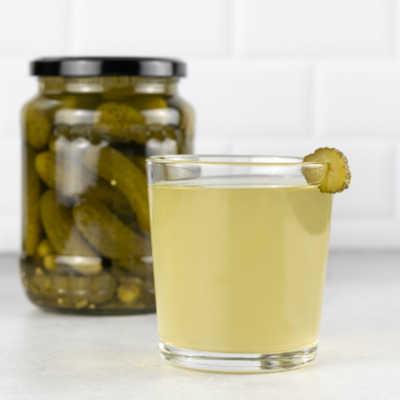Health Benefits of Fermented vs. Pickled Foods
by Chelsea Hafer
In the world of food, two methods of preservation - fermentation and pickling - have gained prominence in conversations about health and well-being.These processes have been cherished across cultures for centuries, offering not only unique flavors but also many health benefits that have stood the test of time.
Health Benefits of Fermented Foods
The process of fermentation is led by the work of live microorganisms—bacteria, yeast, and molds. These microorganisms initiate a process where the sugars and starches within the food are converted into an array of compounds, including beneficial acids, alcohol, and gasses. This process of fermentation gives rise to flavors that are rich, complex, and often described as tangy, umami, or even sour. Beyond their taste profiles, fermented foods boast many health benefits.

Fermentation Kit
Gut Health
Fermented foods are packed with probiotics, microorganisms that support the health of our gut, where food gets processed and nutrients get absorbed. These beneficial bacteria live in our digestive system, working together to maintain a balanced and flourishing gut microbiome. This symbiotic relationship helps with smoother digestion, heightened nutrient absorption, and even a bolstered immune system. The probiotics in fermented foods foster a healthy internal ecosystem with far-reaching effects on overall well-being.

Nutrient Absorption
Fermentation isn't solely about taste - it also helps with nutrient absorption. During the fermentation process, complex molecules within the food break down into simpler forms, rendering the nutrients present in the food more accessible for absorption. This transformation elevates the nutritional value of the food, ensuring that our bodies can more efficiently reap the benefits of vitamins, minerals, and antioxidants in the fermented food.
Inflammation Management
One benefit of consuming fermented foods is the support they bring to immune responses and inflamation management. A harmonious gut microbiome contributes to a more balanced immune system capable of discerning between good and bad bacteria. This balanced immune response can help mitigate unnecessary inflammation, a phenomenon linked to a gamut of chronic diseases, including autoimmune disorders.
Digestive Health
Fermented foods help our digestive systems strike a balance in our microbiome. The beneficial bacteria present in these foods contribute to the breakdown of complex carbohydrates, assisting in the digestive process. This harmonious interaction translates to reduced bloating, discomfort, and digestive distress, paving the way for enjoyable and nourishing meals.
Health Benefits of Pickled Foods
Transitioning from fermentation to pickling, we uncover a different kind of culinary alchemy. Pickled foods are the result of immersing vegetables or other items in a solution, often consisting of vinegar, water, salt, and an array of spices. This preservation technique not only brings a tangy and delightful flavor to foods, but also yields a host of health benefits unique to the pickling process.

Quick Pickle Kit
Easy Digestion
The presence of vinegar in pickled foods can be likened to a supportive hand for our stomachs. It facilitates the breakdown of food, making the digestion process smoother and less likely to result in discomfort. Additionally, certain pickled foods contain enzymes that aid in digestion, contributing to a more enjoyable experience.
Balanced Blood Sugar
The vinegar present in pickled foods might also play a role in regulating blood sugar levels. This holds significance, particularly for individuals dealing with diabetes. Vinegar's potential to enhance our body's handling of sugar translates to a steadier blood sugar profile.
Antioxidant Boost
Antioxidants fend off the harmful effects of oxidative stress on our bodies. Pickled foods safeguard these defenders, effectively bolstering our protection against ailments like cancer and heart conditions. Vegetables commonly used in pickling, such as cauliflower and cabbage, harbor a bounty of these antioxidants.

Hydration Support
A notable aspect of pickled foods lies in their salt content, which can contribute to the body's hydration by aiding the absorption of water. This effect becomes particularly evident when consuming pickled cucumbers, as the salt encourages water retention, ensuring adequate hydration and restoring electrolyte balance.
Pickled vs. Fermented Foods: Which is Better?
Both pickled and fermented vegetables preserve the nutrients in fresh vegetables, extending their shelf life and supporting nutrient absorption. The differences in their preservation does result in several differences in their available health benefits. The main difference in the health benefits between pickled and fermented foods lies in their probiotic properties. Fermentation generates more beneficial bacteria in foods, making them probiotic. Pickled foods, on the other hand, are naturally processed by the vinegar, making them easier to digest. While they are not technically probiotic, they are high in fiber that feed good probiotic bacteria in our guts, making them a prebiotic food. Paired together, pickled and fermented food provide both the nourishment and the diversity that a flourishing gut microbiome needs.
Fermented and pickled foods are full of both flavor and nourishment. Fermented foods help with gut health enhancement, nutrient accessibility, inflammation management, and digestive harmony. Meanwhile, pickled foods facilitate digestion, blood sugar regulation, antioxidant enrichment, and hydration support. These preservation techniques don't just elevate our culinary experiences; they bring us wellness from within. Whether indulging in the complex tang of sauerkraut or enjoying the zesty kick of pickled cucumbers, every bite of fermented and pickled foods carries within it an offering of health nurtured by age-old wisdom of culinary alchemy. As you begin - or continue - your journey in the kitchen, consider incorporating these foods into your diet, savoring not only the flavors but also the nourishment they provide to your overall wellness.